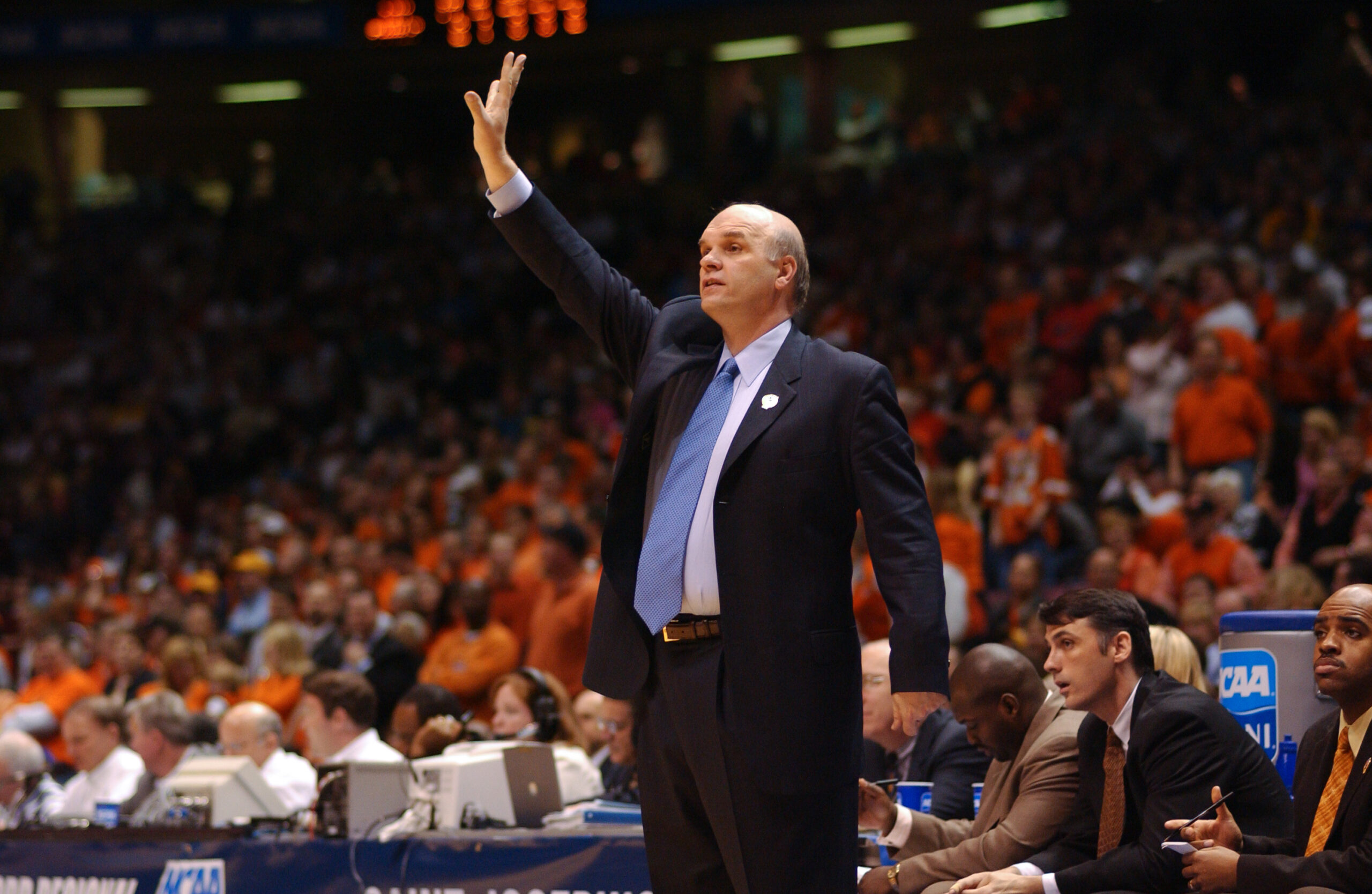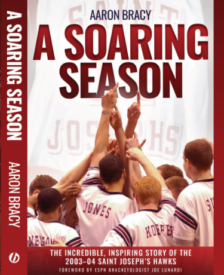
Phil Martelli calls out instructions during Saint Joseph's game against Oklahoma State in the NCAA Elite 8 on March 27, 2004. (Photo: Greg Carroccio/Sideline Photos)
By AARON BRACY
September 17, 2025
Big5Hoops.com
From eighth grade on, Phil Martelli wanted to coach Saint Joseph’s University. He became enamored with coaching from watching games at the Palestra, where he would take a trolley from his childhood home in Southwest Philadelphia for Big 5 doubleheaders. While other kids might have dreamed of becoming the star players they saw on the court, Martelli wanted to be the next Jack Ramsay or Jack McKinney, both former Hawks coaches.

Sponsored
Click HERE to order a signed copy of my book, A Soaring Season: The Incredible, Inspiring Story of the 2003-04 Saint Joseph’s Hawks.
What follows is an excerpt from pages 12–14 of Chapter 2 (Phil Martelli’s Dream Job) of my book, A Soaring Season: The Incredible, Inspiring Story of the 2003–04 Saint Joseph’s Hawks (Brookline), that details how Martelli finally got the chance to lead the Hawks. You can order the book HERE, or wherever books are sold.
Three-Part Big5Hoops.com Special Series
Monday: Phil Martelli reacts to Joe Lapchick Character Award honor
Tuesday: Column on Martelli’s impact on my career
Today: Book excerpt from A Soaring Season: The Incredible, Inspiring Story of the 2003-04 Saint Joseph’s Hawks
***
On April 4, 1990, Griffin became the 13th head men’s basketball coach in Saint Joseph’s history. Like Griffin, Boyle (who coached from 1981 to 1990) was a St. Joe’s graduate. So was Jim Lynam (1978–81) before Boyle, Harry Booth (1974–78) before Lynam, McKinney (1966–74) before Booth, Ramsay (1955–66) before McKinney, and John McMenamin (1953–55) before Ramsay. The last time a non–St. Joe’s graduate led the program was in 1952, when Penn grad Bill Ferguson finished his 25th year at the helm. The Hawks had only one other coach without a St. Joe’s degree, Edward Bennis, like Ferguson a Penn grad, who coached just one season in 1910–11.
Even if Martelli had all of the intangibles of a hotshot assistant and was the most serious person in the room, it probably wouldn’t have mattered because of his degree. As a consolation, while not the job he really wanted, Martelli was still on the Hawks bench, now working for the fiery Griffin. Hurt in part by injuries, Griffin never had the success he anticipated when he returned to Saint Joseph’s, and he resigned in the summer following the 1995 season to return to private business after a combined 75-69 record over five seasons that were void of an NCAA appearance.
Griffin officially resigned on July 11, 1995. Martelli was 40 years old, a month away from turning 41. He had been an assistant coach at St. Joe’s for 10 years. His only head coaching experience was leading 16- and 17-year-olds at Bishop Kenrick. Late in Griffin’s tenure, Martelli was a leading candidate for the head coaching job at Loyola University Maryland. He didn’t get it. Devastated, he returned home, only to be uplifted by a handmade card from his three children, Phil Jr., Jimmy, and Elizabeth, telling him how much they loved him. Maybe that would be the closest Martelli would ever come to a head coaching job. But then Griffin resigned.
Would Martelli get a chance to succeed him?
He wasn’t a Hawks graduate. He didn’t have a head coach’s résumé. He didn’t quite have the look.
Maybe Martelli never would be a college head coach, at St. Joe’s or anywhere. Or maybe, this time, he wouldn’t be overlooked. At the very least, unlike after Boyle resigned, Martelli would be a legitimate candidate to become the Hawks coach.
“I knew he was a major part of the program,” St. Joe’s athletic director Don DiJulia said. “I asked John Griffin if he thought Phil was ready to be a head coach, and John didn’t hesitate and said, ‘Yes.’ OK, fine. He’s in the bucket. He’s capable. He’s internal. He knew the university, knew his love and passion for the university. And he was well-connected in the area from his playing days and coaching days.”
Martelli interviewed well enough to become a finalist. Besides his undergraduate institution, there were two additional things working against Martelli: a four-person selection committee and, just as with his later recruitment of Nelson, James “Bruiser” Flint.
***
Unlike Martelli, Flint could have been a candidate for a GQ magazine cover. Handsome, fit, intense, successful—Flint had it all. He was the prototype for a young, hotshot assistant. He helped head coach John Calipari build a national powerhouse at UMass, unheard of for an Atlantic 10 school. The Minutemen had just wrapped up their fourth straight NCAA tournament appearance, averaging a remarkable 27.8 wins per season over that stretch. The next year, in 1995–96 behind star forward Marcus Camby, UMass would reach the Final Four.
It wasn’t a question of whether Flint would become a head coach, it was a matter of when and where. And what better place than his alma mater, where he would continue the tradition of St. Joe’s graduates as head coach dating all the way back to when McMenamin took over for Ferguson in 1953. It also likely could not have helped Martelli that Flint publicly expressed his interest in the Hawks job. Like Martelli, Flint interviewed with the four-person committee. And they were impressed. Very impressed.
“At the end of the day, you want someone with high character, with belief in the institution and the mission, and someone you project being able to work across the departments at the university to rally people to support what you need to do,” DiJulia said.
The committee felt that both Martelli and Flint possessed the desired traits, but neither coach had a consensus from the four members.
“The bottom line was the group was split,” DiJulia said. “It wasn’t unanimous in terms of saying, ‘This is easy.’ It wasn’t easy.”
Then and today, DiJulia is one of the most respected administrators in college athletics. He officially retired as the Hawks athletic director in 2018 but was still serving the school in a consulting role in 2024. He was a member of the famed 1964–65 Hawks team, began his first of two stints as the school’s AD in 1976, and returned home to Hawk Hill in 1988 for his second term as AD after eight years as commissioner for the East Coast Conference (1981–84) and Metro Atlantic Athletic Conference (1984–88).
DiJulia loves the school, loves the alumni, loves Flint, and loves the unique tradition that hiring him would have continued. He also had gotten to know Martelli the previous seven years and just felt, even minus the coveted degree and in spite of the strength of Flint’s candidacy, that Martelli was the right choice at that time.
When the deadlocked committee returned for another day of deliberations, DiJulia explained why Martelli was their man. And his voice carried weight.
“After we talked why Phil was at the top of the list on my point, then everyone clearly bought in,” DiJulia said.
Martelli had been an anxious wreck for a week and left his office the morning of the committee’s final meeting to drive to a destination, not knowing exactly where he was going. He ended up at Valley Forge National Historic Park, found a bench under a tree, unfurled his Philadelphia Daily News, opened a bag of soft pretzels, turned up his cell phone ringer, and tried not to think about how his whole life was about to change for better or worse.
DiJulia finally called Martelli. Father Nicholas Rashford, St. Joe’s president, delivered the life-altering news Phil Martelli had been dreaming about since eighth grade: He was selected as the 14th head coach in Saint Joseph’s history. It became official on July 20, 1995.
Martelli had achieved his dream. “Tears, for sure,” he said of his reaction.
After wiping away the tears, it was time to get to work. Martelli had prepared for this moment for nearly 30 years and wouldn’t waste even a minute making the most of the coveted opportunity.
“I started to process and it was, ‘What’s the next steps?’” he said. “I was already in that planning mode of who do I contact, how do I contact them. What about the players? It was always my want to have a plan in mind, and that’s what kicked in.”
He had learned an important lesson about time management his first time as a head coach, and he wouldn’t make the mistake of not being prepared again.
—
Aaron Bracy has covered sports in Philadelphia for nearly three decades for various publications and as a freelancer for the Associated Press. His first book, A Soaring Season: The Incredible, Inspiring Story of the 2003–04 Saint Joseph’s Hawks (Brookline), can be ordered HERE. He is working on his second book, which will chronicle the memorable 2000–01 season of Allen Iverson and the Philadelphia 76ers. Follow Bracy on social media HERE. Contact him at bracymedia@gmail.com.